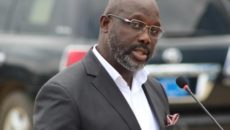In 2009, an international audit commissioned by the government discovered that only 2 out of 68 resource contracts in the agriculture, forestry, mining, and petroleum worth some US$8 billion were conducted legally by both the Executive and Legislature branches.
At least one of those resource contracts involved the U.S. oil giant, Chevron. Later in 2016, as a consequence of emails leaked by the international transparency group Global Witness, the former speaker of the House, Rep. Alex Tyler of Bomi, and Sen. Varney Sherman of Grand Cape Mount, also the chairman of the then ruling United Party, were charged and indicted for receiving “over US$950,000 in bribes and other suspicious payments†from the British company Sable Mining to facilitate the amendment of Liberia’s procurement and concession law to enable the company qualify for a lucrative mineral contract in Liberia.
Many such allegations of bribery go uninvestigated of unpublicized, never sanitized by the light of day.
But there is a more sinister aspect of the conduct of today’s legislature which deserves special attention. It is the rising level of secrecy and surreptitiousness with which the legislature prefers to conduct the people’s business, a manner unique only to a cult. The civil society group IREDD released a 2016 report that accused both the House and Senate of shadowy decision-making, with legislative amendments and budget deals frequently hatched in committee room “behind closed doors.â€
The lack of transparency and accountability inherent in the “Aye and Nay†voting practice of both the House and the Senate, which was first highlighted in the 2012 Liberian Democracy Institute Monitoring Report, seems to continue unabated. A 2017 article by The Bush Chicken that won the Press Union’s Legislative Reporting of the Year award revealed that despite the provision of an electronic public address system capable of recording the tallying attendance and votes casts by every legislator on every bill passed, both the House and Senate have refused to use recording system since its installation in 2015.
The implication of this refusal is the lack of any records about how legislators vote, and that citizens and the general public may never know what and how their elected representatives are voting on their behalf. Associated with each law passed are simply the number of “Ayes and Nays,†but never the names of legislators.
Such a level of opaqueness has no parallel in the history of legislative conduct.
One excuse reportedly given for this practice in the Senate by then Senate President Pro Tempore Gbehzohngar Findley is that regular quorum is difficult to attain at the official commencement of session – 10:00 a.m. Therefore, recording attendance at that time would have been embarrassing to the Senate.
But far more embarrassing was the boldfaced admission by Findley that his members feared that they may be confronted by their voting record, and risk retribution from an electorate unhappy with how they voted. In other words, on election day, Liberian legislators prefer to confront ignorant voters who know nothing about what they do on Capitol Hill.
Of late, at least two particular instances stand out. The first involves the recent passage of the so-called Bali Island Act in which the government granted an interest the right to construct a “modern†convention center to be named in honor of the Indian icon, Mahatma Gandhi. There was neither any public debate on the draft bill, nor any effort to entertain expert opposition to the proposed construction for fear it would eliminate the natural barrier the island provides to flooding.
The legislature seemed equally dissuaded by suggestions that such an agreement contravenes existing international agreements prohibiting such natural ecosystem. And although the bill has already been signed into law, the public is yet to see its content despite repeated promises by both the speaker of the House and key cabinet officials, including the influential minister of finance, Samuel Tweah, that it would be released to the public.
The second instance pertains to the ongoing controversy surrounding the printing of new Liberian dollar banknotes. Under normal circumstances, legislative approval for the printing of currency was almost automatic, once the Central Bank of Liberia provided clear economic justifications. But these aren’t normal times and circumstances.
Just over one year ago, new banknotes valued at L$16 billion (US$104 million) reportedly disappeared from the Freeport of Monrovia where they were temporarily stored upon entering the country during the final days of President Ellen Johnson-Sirleaf’s presidency. At least two independent inquiries into the scandal revealed extreme malpractice by Central Bank officials for which the Bank’s executive governor and a second member of the Board of Governors were forced to resign. Executive Governor Milton Weeks, his deputy governor Charles Sirleaf (son of former President Sirleaf), and another staff of the bank have been arrested and are on trial in connection with the banknotes scandal.
A subsequent US$25 million ‘mopping-up’ exercise by the Weah Administration’s Economic Management Team headed by Finance Minister Tweah made matters even worse, itself marred by allegations of misapplication, inappropriate reinfusion of currency retrieved back into circulation, and possible money laundering by the Kroll Report.
The government’s own General Auditing Commission report also found the Economic Management Team liable by inappropriate activities, lack of robust and effective accountability procedures, including failure to account for some US$5 million. In a recent letter addressed to the national legislature, the GAC continues to strenuously object to the printing of any banknotes unless the issues flagged in both the Crane and GAC reports are adequately addressed.
And yet, the House of Representatives, under Speaker Bhofal Chambers of Maryland, appears unmoved by these oppositions. The firebrand talk show host Henry P. Costa recently released a copy of a resolution that he alleged scores of lawmakers had already secretly signed supporting printing new banknotes. Costa’s allegations appear to have been confirmed by the recent public statements of Rep. Dorwohn Gleekia of Nimba’s sixth district on ELBC Radio, in which Gleekia acknowledged signing such a resolution. But many others continue to deny there is even such a resolution.
Such secret resolutions, subterranean activities, and other forms of limited transparency by the legislature do not foster public trust. Instead, they breed cynicism and discontent among the population who, whether rightly or wrongly, assume that legislators’ decisions are always motivated by “brown envelopes.” Such legislative opaqueness also undermines the very idea of representative democracy.
The people are left to fetch for themselves. Does it, therefore, come as a great shock when every segment of society takes to the streets in large numbers to air their grievances through violent street protests – from schoolteachers to 12-year-old students, to minorities and disabled, and members of crime-infested communities across Monrovia?
For the sake of national stability and peace, the legislature – both the Senate and House – must reunite with its original purpose – to fairly, equitably and transparently advocate the interests of their individual constituents, and the entire Liberian citizenry. Equally urgent must be the return to its true purpose of checking the excesses of an ‘imperial president,’ not facilitating them.
Without a firm demonstration of their commitment to the interests of the Liberian people, one wonders what other purposes they serve other than a major drag on the scarce finances of the nation. Liberians are fast losing faith in their elected representatives, individually and collectively. The death of the National Legislature seems eminent. Or has it already occurred?
Featured photo by Zeze Ballah



